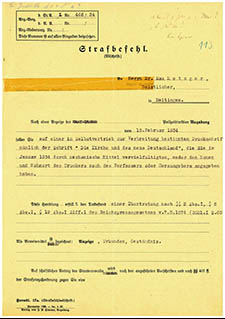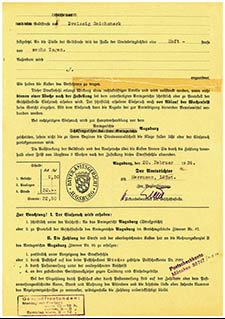Metzger and National Socialism
Metzger had already clashed with National Socialism before 1933. His attack of the NSDAP at one of its assemblies in 1932 was brought up again in April of 1940 when he was expelled from the Reich Chamber of Literature (K. A. Altmeyer, Presse, 33). Metzger condemned anti-Semitism (Was hat der Katholik?) in September of 1932, and criticized Hitler vehemently in private, going as far as contemplating an assassination attempt in February of 1933 (M. Möhring, Täter, 141). National Socialism had replaced the old order with nothing better (Die grosse Entscheidung).
In May of 1933, Metzger discussed the right to topple the existing political system and the validity of a new established law. Just as conservatives had combatted the Republic with such deliberations in the preceding years, he now made clear that he judged the new state skeptically (Die nationale Revolution).
In January of 1934, Metzger demanded that the Church oppose the idolatry of power, Machiavellism and aggressive foreign policy. He felt that Hitler ought to expect support only for an anti-war policy. Metzger also expressed doubt about the “Socialism” of the governing authorities who were more likely servants of capital (Friede dem deutschen Volke!).
In an anonymous memorandum on “The Church and the New Germany”, Metzger reflected on the relationship of the Church to the Third Reich following the conclusion of the Reich Concordat. He saw three options: First, resigned inactivity, second, negative activism, i.e. open struggle against party and state, or, third, positive activism, i.e. cooperation between church and state (M. Möhring, Täter, 145). Despite tremendous political reservations, Metzger saw an opportunity in the latter for the Catholic Church to evangelize.
In response to his memorandum and its mailing to Catholic deans (Die kirchliche Lage, 15), Metzger was taken into “protective custody” in Augsburg for three days in January of 1934 and sentenced to a fine for publishing anonymously.
In the ensuing period, Metzger refrained from disseminating his writing. However, he took in Carl Klinkhammer (1903–1997), a chaplain in Essen, in Meitingen. Klinkhammer had been arrested during a service in April of 1933 because of a critical sermon and was the first Catholic clergyperson taken into “protective custody”. He was detained for political reasons later, too. He was released only after the Ordinariate of Cologne gave assurances that he would neither work in ministry any more nor have contact with other individuals in the future, thus marginalizing him professionally. Metzger remained in contact with Franziskus Stratmann (1883–1971), the head of the “Peace League of German Catholics”, who had emigrated to the Netherlands at the end 1933.
Metzger’s work was systematically decimated in the following years. The Christkönigsbote was banned in 1935 and the Bavarian Political Police and Munich Customs Police searched his residence on suspicion of “currency fraud” in January of 1936. Although no evidence was found, charges were pressed against Metzger nonetheless since members of the Society of Christ the King had allegedly obtained fare reductions from the Reichsbahn fraudulently (Die kirchliche Lage, 92f.).
The homes in Graz, Brno, Untertannowitz and in Buchenhorst were confiscated in 1939 without compensation. In 1940, Metzger was banned from working as a bookseller because of his political unreliability. The Gestapo confiscated files and work papers in Meitingen in July and August of 1943.
Source / title
- © Archiv des Christkönigs-Instituts, Meitingen


